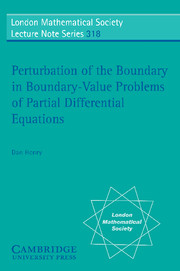Book contents
- Frontmatter
- Contents
- Introduction
- 1 Geometrical Preliminaries
- 2 Differential Calculus of Boundary Perturbations
- 3 Examples Using the Implicit Function Theorem
- 4 Bifurcation Problems
- 5 The Transversality Theorem
- 6 Generic Perturbation of the Boundary
- 7 Boundary Operators for Second-Order Elliptic Equations
- 8 The Method of Rapidly-Oscillating Solutions
- Appendix 1 Eigenvalues of the Laplacian in the Presence of Symmetry
- Appendix 2 On Micheletti's Metric Space
- References
- Index
5 - The Transversality Theorem
Published online by Cambridge University Press: 22 January 2010
- Frontmatter
- Contents
- Introduction
- 1 Geometrical Preliminaries
- 2 Differential Calculus of Boundary Perturbations
- 3 Examples Using the Implicit Function Theorem
- 4 Bifurcation Problems
- 5 The Transversality Theorem
- 6 Generic Perturbation of the Boundary
- 7 Boundary Operators for Second-Order Elliptic Equations
- 8 The Method of Rapidly-Oscillating Solutions
- Appendix 1 Eigenvalues of the Laplacian in the Presence of Symmetry
- Appendix 2 On Micheletti's Metric Space
- References
- Index
Summary
The transversality theorem (or transversal density theorem) of Thom and Abraham is a tool useful in many branches of geometry and analysis. The usual form [1, 32, 35, 42] makes unnecessarily strong hypotheses for the case of negative Fredholm index. We will prove some generalizations, aimed at infinite-dimensional applications, with special attention to the case of negative index. (We will see many examples with index —∞ in Ch. 6).
Our terminology is that of Lang [17] and Abraham and Robbin [1] except for “codimension,” defined in 5.15, and “σ-proper,” defined in 5.4(3). See 5.13–14 for semi-Fredholm operators.
This chapter is logically self-contained except for Sard's theorem. We will use only Theorem 5.4 in the sequel, but other variations on the theme of transversality seemed of sufficient interest to be worth recording.
Theorem 5.1. Sard's Theorem (Brown-Morse-Sard). Let A ⊂ ℝnbe an open set and f : A → ℝma Ckmap, where k is a positive integer and k > n — m. Then the set of critical values of f has measure zero in ℝmand is meager (= first Baire category).
Proof. See [1] or [37].
Recall that x is a regular point of ƒ if the derivative ƒ′(x) is surjective; otherwise x is a critical point.
- Type
- Chapter
- Information
- Perturbation of the Boundary in Boundary-Value Problems of Partial Differential Equations , pp. 60 - 78Publisher: Cambridge University PressPrint publication year: 2005

